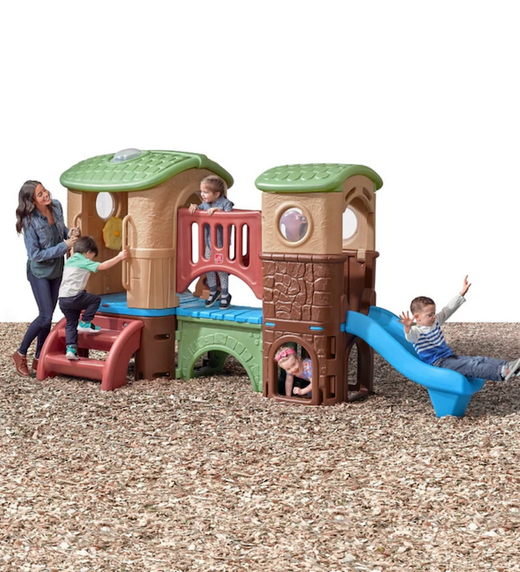From an early age, climbing gives children the foundation to adapt to new and unknown situations. Whether your crawling infant climbs over some pillows or your toddler finds his way onto the back of your couch, climbing has several cognitive development benefits. Luckily for parents, furniture doesn’t need to be the source of this activity. Step2 has several climbing toys for kids and toddlers to safely play on.
With so many ways to play, climbers and slides keep kids entertained—and outside—for hours on end! Plus, they are a fun way to exercise their muscles and their minds. Read on to learn more about the cognitive benefits of climbers in our curated list!
1. Motor Skill Development
Climbing involves the whole body and engages both gross and fine motor skills. When your little one climbs a pretend rock wall, pulls themselves up onto a top platform, or crawls through a tunnel, they’re using the large muscles in their legs, arms, back, and core. While playing with climber toys, they’ll also learn to balance and control their body as they go down the slide.
When grasping the pretend rocks and propelling themselves up the wall, children are exercising their hand and wrist muscles—which is a fun and exciting way to work on their fine motor skills development! These skills are also in use when littles ones grip handles, platforms, and ladders.
Play Tip: The Step2 Skyward Summit™ has both rock-wall-style sides and a ladder for multiple ways to climb.
2. Physical Activity
Climbers are designed as back-and-forth activity centers, meaning once a child goes down the slide or jumps off the platform, they need to run back to start the action all over again. This kind of play gets kids active and exercising without even knowing it! And, the excitement of being outside and running around a playset does a kid’s body good.
Play Tip: Toddler climber toys, such as the Step2 Safari Truck Climber™, provide little ones with several physical activities to help them gain coordination and develop their muscles.
3. Critical Thinking
Climbing involves the same cognitive functions as solving a puzzle. When climbing, children must concentrate on what move to make next. They also use spatial thinking to relate their bodies with their surroundings.
To make it to the top of the climber toy, kids work out where their hands and feet need to be placed to help push themselves up. This is especially challenging with a rock-wall-style climber, where there are many options for where to grip!
Through repetition, kids will learn how to solve the problem and make it to the top all on their own—with parental supervision, of course! These actions help improve memory, critical thinking, and creativity.
Play Tip: Rock-climbing designs present several routes for kids to work through as they climb. If you’re looking for toys for cognitive development, check out the Step2 Naturally Playful™ Woodland Climber™.
4. Social Skills
Climber toys are also a great way for children to build social skills! The open design makes them great for multiple kids to play together. Little ones practice taking turns and patience as they wait their turn to go down the slide.
As children climb, their friends may communicate helpful tips on where to place their hands and feet. As they reach the top, they celebrate together, building morale as well as a sense of teamwork.
Play Tip: Climbing is a great social activity that encourages listening, communication, patience, and teaching.
5. Imaginative Play
Getting outside to play breaks up kids’ normal routines, letting them expand their imaginations and learn to improvise based on what a friend says or does. When kids play together, they build off of each other as they create stories, assign roles, develop rules, and act out their scenarios.
Play Tip: Jump start their creativity with cognitive toys for toddlers, such as the Step2 Play Ball Fun Climber™ or Step2 Scout & Slide Climber™.
Climbing Toys for Cognitive Development
Climbing is a workout for the whole body—including the mind! Kids’ climbing toys are a great way to develop fine and gross motor skills, build social skills, and engage in physical activity. They also encourage determination, planning, goal setting, and critical thinking.
With all these great benefits, it’s time to get your little thrill seekers on a climber playset of their own! For the best climbing toys for toddlers, check out Step2.com! These climbers are a great way to get your children playing outdoors, exercising, and boosting their cognitive skills.





